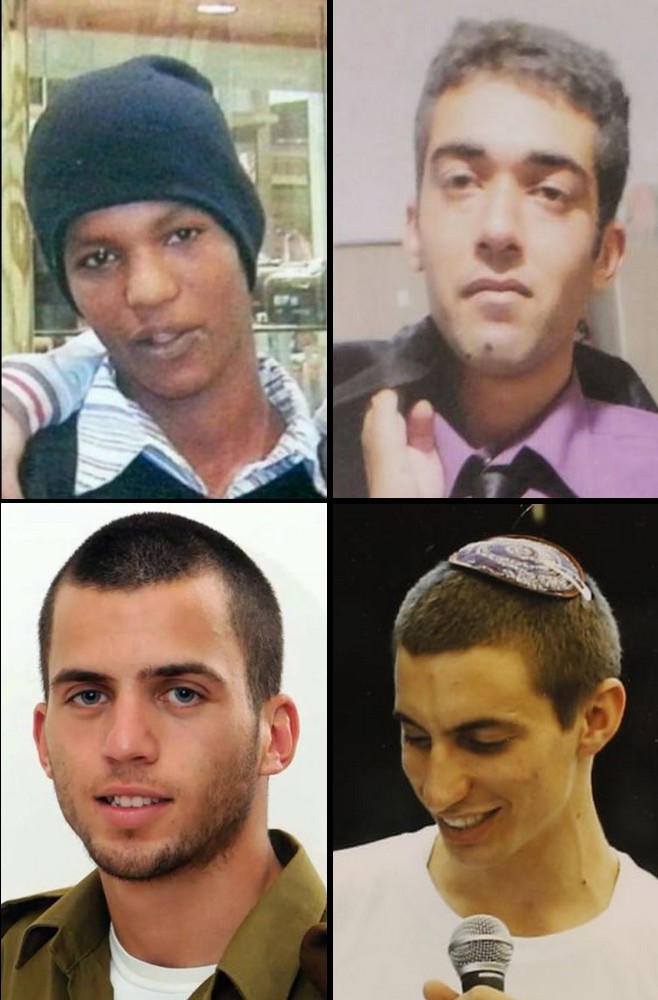Hamas leader Ismail Haniyeh reportedly said on Friday that Egypt was mediating between Israel and the terror group over a possible prisoner swap.
Hamas is currently holding the bodies of IDF soldiers Hadar Goldin and Oron Shaul, both killed in the 2014 war, as well as civilians Avera Mengistu and Hisham al-Sayed, two Israelis who entered Gaza of their own accord.
According to Channel 12 news, Haniyeh, who heads the political bureau of Hamas, which controls the Gaza Strip, said that an Egyptian delegation had visited the coastal enclave in recent days for talks on a number of matters, including a potential prisoner exchange.
“Our brothers in Egypt are following up on several issues, including the reconciliation [presumably between Hamas and Fatah], the Rafah border crossing, and the prisoners’ exchange,” Haniyeh reportedly told journalists in Beirut.

Clockwise from top left: Avera Mengistu, Hisham al-Sayed, Hadar Goldin and Oron Shaul. (Flash 90/Times of Israel)
The Channel 12 report said Haniyeh hoped the meetings “would lead to an achievement” for the terror group. Haniyeh is seen as trying to shore up support among Palestinians with a possible leadership contest on the horizon.
Hamas said in June that a precondition for any prisoner swap deal with Israel was the release of dozens of terror convicts cut loose in a 2011 exchange and since rearrested. In a 2011 deal with Hamas, Israel released 1,027 Palestinian terror convicts in exchange for captive Israeli soldier Gilad Shalit, who had been abducted in 2006.
Earlier this month, Israel’s security cabinet approved a new policy that allows Israel to keep the bodies of all Palestinians who are believed to have committed attacks, whether or not they were affiliated with the Hamas terror group.
Defense Minister Benny Gantz said that he had asked the cabinet to pass the new policy because he believed it would help bring back Israeli captives.
Previous Israeli policy was only to hold onto the bodies of Hamas terrorists for a potential prisoner exchange with the terror group. Others were returned to their families for burial.
Whether holding the bodies of attackers is an effective policy is a subject of debate within the security establishment. Some believe that it gives Israel additional leverage in negotiations with Hamas, as well as acting as a deterrent against attacks. Others see it as ineffective and based on shaky legal ground.

Homeowner Osnat Malka inspects damage from a rocket fired overnight from the Gaza Strip, in Sderot, Israel, Aug. 21, 2020 (AP Photo/Tsafrir Abayov)
Hamas announced at the start of the month that international mediators had brokered a new set of “understandings” with Israel, halting the latest round of fighting for the time being in exchange for an easing of Israeli restrictions on the Gaza Strip.
The announcement followed an escalation of violence in recent weeks, which has apparently calmed, in which Hamas-affiliated groups lofted incendiary balloons and fired short range rockets into Israel, and Israeli warplanes struck areas in the Gaza Strip.
 RSS Feed
RSS Feed















 September 12th, 2020
September 12th, 2020  Awake Goy
Awake Goy  Posted in
Posted in  Tags:
Tags: 













